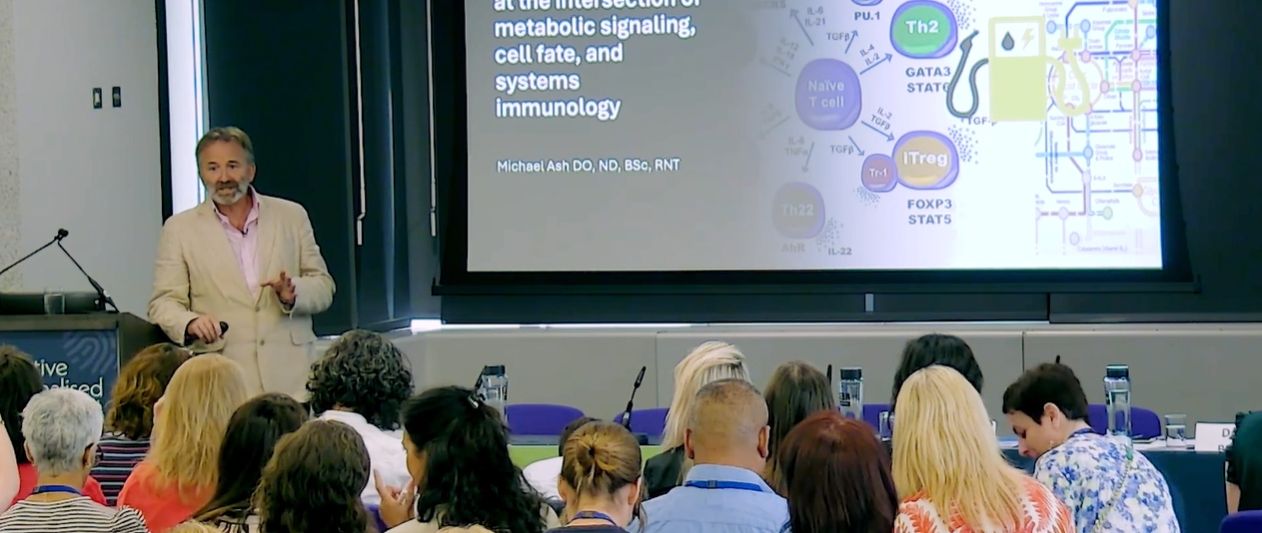Fuelling the Fight ' The Critical Interplay of Metabolism and Immune Function in Metabolic Immunity and Immunometabolism by Michael Ash

🏠︎ | Past Presentations | Advanced Practitioner | Metabolism and Immune Function in Metabolic Immunity and Immunometabolism
-
Event: IPM Congress 2024
-
Date: 8th June 2024
-
By: Michael Ash
-
Estimated Read Time: 7–8 minutes
Introduction
At the IPM24 Advanced Practitioner Forum, Michael Ash captivated attendees with an insightful exploration of immunometabolism—the intricate relationship between metabolism and immune function. With decades of expertise in functional medicine and an engaging delivery, Ash delved into how diet, age, and environmental factors intertwine with immune cell functionality. His session underscored the increasing relevance of metabolic dysfunction and inflammation in modern health challenges, offering actionable strategies for clinical practice.
Drawing from cutting-edge science and clinical experience, Ash illuminated how metabolic interventions can not only restore balance but also empower immune cells to fight disease more effectively. His presentation offered a roadmap for practitioners seeking to bridge complex scientific principles with practical patient care.
The Dynamic Relationship Between Metabolism and Immunity
Ash opened his presentation by introducing the concept of immunometabolism, emphasising that metabolism underpins all biological processes, particularly immune function. He likened this relationship to a handshake, where metabolic changes directly influence immune cell activity. Immune cells, in turn, can shape metabolic states through inflammatory signalling and cytokine production.
Key points included
- Bidirectional Influence: Immune cells depend on nutrients and metabolic signals to function, while metabolic pathways are modulated by immune activity.
- Environmental Sensitivity: Immune cells respond dynamically to environmental stimuli, enabling them to transform into pathogen-fighting machines or, under adverse conditions, pro-inflammatory agents.
- Metabolic Dysregulation: Poor metabolic regulation can push immune cells into a dysfunctional state, driving chronic diseases like type 2 diabetes and autoimmune disorders.
“By altering metabolic function, you can indirectly transfer benefit to the immune system” Ash stated, highlighting the potential of targeted interventions.
Immune Cell Functionality: Balancing Defence and Damage
A core theme of Ash’s presentation was the versatility of immune cells. Unlike most body cells, immune cells can migrate across tissues, adapt to environmental signals, and influence neighbouring cells. This adaptability is crucial for host defence but also introduces risks.
Ash explained two critical processes for maintaining immune balance:
- Apoptosis – Programmed cell death that prevents tissue damage and promotes healthy turnover.
- Autophagy – The clearance of damaged cellular components to sustain immune function.
When these processes falter, immune cells may contribute to chronic inflammation and disease. This phenomenon, termed inflammaging, becomes increasingly prevalent with age. “Each acute infection ages the immune system” Ash noted, underscoring the cumulative impact of metabolic and immune stress on health.
Sterile Inflammation: A Hidden Threat
Ash shed light on the concept of sterile inflammation, a non-infectious form of inflammation triggered by metabolic dysfunction or cellular damage. He referenced the groundbreaking danger theory by immunologist Polly Matzinger, which posits that immune responses are driven by damage-associated molecular patterns (DAMPs) rather than pathogens alone.
Key insights included
- DAMP Triggers: Damaged cells release molecules like histones, ATP, and DNA fragments, which signal the immune system to initiate an inflammatory response.
- The NLRP3 Inflammasome: This key immune structure drives inflammation in conditions like type 2 diabetes, where chronic hyperglycemia damages pancreatic beta cells.
- Metabolic Overload: Excessive caloric intake and poor dietary choices exacerbate sterile inflammation, creating a feedback loop of metabolic and immune dysfunction.
Ash highlighted the alarming rise in type 2 diabetes among younger populations, attributing it to lifestyle-driven metabolic imbalances. “We are eating ourselves into metabolic dysfunction,” he warned, urging practitioners to address these root causes.
Practical Interventions for Immunometabolic Health
Despite the complexity of immunometabolism, Ash offered practical tools for mitigating metabolic dysfunction and enhancing immune resilience.
-
Dietary Fibre
- Short-chain fatty acids (SCFAs) derived from fibre—such as butyrate and propionate—play a pivotal role in regulating immune tolerance and gut health.
- Ash advocated for increased fibre intake, citing its ability to modulate inflammation and support gut-immune interactions.
-
Polyphenols and Phytonutrients
- Compounds like curcumin, resveratrol, and EGCG (green tea extract) provide anti-inflammatory benefits and improve metabolic signalling.
- He emphasised the role of plant-based diets in supporting immune function.
-
Nutrient Balance
- Ash discussed the importance of retinoic acid (vitamin A) and vitamin D in maintaining immune tolerance. He cautioned against over-supplementation of vitamin D without adequate vitamin A, particularly in individuals with genetic predispositions affecting nutrient conversion.
- Ash discussed the importance of retinoic acid (vitamin A) and vitamin D in maintaining immune tolerance. He cautioned against over-supplementation of vitamin D without adequate vitamin A, particularly in individuals with genetic predispositions affecting nutrient conversion.
-
Lifestyle Adjustments
- Structured exercise, stress management, and adequate sleep were highlighted as critical components of metabolic and immune health.
- He recommended personalised approaches to optimise these interventions based on individual patient needs.
-
Stewed Apples for Immune Support
- As a simple and accessible intervention, Ash recommended stewed apples for their ability to induce interleukin-2 and TGF-beta, promoting a regulatory T-cell phenotype.
The Bigger Picture: Addressing Lifestyle Diseases
Ash concluded with a sobering call to action: practitioners must tackle the global epidemic of metabolic dysfunction and lifestyle-related diseases. He emphasised the economic and societal costs of these conditions, urging attendees to leverage their expertise in nutrition and functional medicine to drive meaningful change.
Final Thoughts
Michael Ash’s presentation at the IPM24 Advanced Practitioner Forum offered a masterclass in understanding and addressing the complex interplay between metabolism and immunity. By blending scientific insights with practical strategies, Ash equipped practitioners with the tools to improve patient outcomes in an era increasingly dominated by lifestyle-driven health challenges.
Key Takeaway: The path to restoring immune and metabolic health lies in targeted dietary, nutritional, and lifestyle interventions—simple yet powerful tools that can transform patient care.
Further Reading
For those interested in exploring Michael Ash's work on immunometabolism and metabolic interventions, here are some recommended articles and resources:
-
Immune Resilience with Michael Ash: An on-demand webinar discussing the role of specific nutrients in enhancing immune resilience and viral resistance.
-
Immunometabolism – Nutrition is Key: An article exploring the complex relationship between diet, nutrients, and immunity, with significant implications for preventing and managing various diseases.
-
Vitamin A: The Key to A Tolerant Immune System?: A review by Michael Ash on the profound effects of vitamin A on the gut mucosal immune system.
-
For more resources and information on Michael Ash's work, visit his website: https://www.clinicaleducation.org
For more resources and transcribed sessions from the Advanced Practitioner Conference, visit our Advanced Practitioner Conference page.
Get Access to the Full Conference Recording!
Submit the form below to unlock the complete video recording - don't miss out on insights from leading experts and thought leaders!
)
)
)

.jpg.png)
|https://cdn.asp.events/CLIENT_Progress_084371A2_5056_B739_5406DC209314F095/sites/IPM-2025/media/libraries/exhibitors/NuVius.png/fit-in/640x9999/filters:no_upscale())
|https://cdn.asp.events/CLIENT_Progress_084371A2_5056_B739_5406DC209314F095/sites/IPM-2025/media/libraries/exhibitors/Apex-Energetics.png/fit-in/640x9999/filters:no_upscale())
|https://cdn.asp.events/CLIENT_Progress_084371A2_5056_B739_5406DC209314F095/sites/IPM-2025/media/libraries/exhibitors/Pure-Encapsulations-NEW3.jpg/fit-in/640x9999/filters:no_upscale())
|https://cdn.asp.events/CLIENT_Progress_084371A2_5056_B739_5406DC209314F095/sites/IPM-2025/media/libraries/exhibitors/Nordic labs NEW.png/fit-in/640x9999/filters:no_upscale())
|https://cdn.asp.events/CLIENT_Progress_084371A2_5056_B739_5406DC209314F095/sites/IPM-2025/media/libraries/exhibitors/Nelsons Corporate logo.jpg/fit-in/640x9999/filters:no_upscale())
|https://cdn.asp.events/CLIENT_Progress_084371A2_5056_B739_5406DC209314F095/sites/IPM-2025/media/libraries/exhibitors/Lingo_Made-by-Abbott-002-crop.png/fit-in/640x9999/filters:no_upscale())
|https://cdn.asp.events/CLIENT_Progress_084371A2_5056_B739_5406DC209314F095/sites/IPM-2025/media/libraries/exhibitors/Venn-Healthcare.png/fit-in/640x9999/filters:no_upscale())
|https://cdn.asp.events/CLIENT_Progress_084371A2_5056_B739_5406DC209314F095/sites/IPM-2025/media/libraries/exhibitors/Pharma-Nord-logo-full-size.jpg/fit-in/640x9999/filters:no_upscale())
|https://cdn.asp.events/CLIENT_Progress_084371A2_5056_B739_5406DC209314F095/sites/IPM-2025/media/libraries/exhibitors/Vibrant-Wellness.png/fit-in/640x9999/filters:no_upscale())
|https://cdn.asp.events/CLIENT_Progress_084371A2_5056_B739_5406DC209314F095/sites/IPM-2025/media/libraries/exhibitors/Nutrined.png/fit-in/640x9999/filters:no_upscale())
|https://cdn.asp.events/CLIENT_Progress_084371A2_5056_B739_5406DC209314F095/sites/IPM-2025/media/libraries/exhibitors/ATP.png/fit-in/640x9999/filters:no_upscale())
|https://cdn.asp.events/CLIENT_Progress_084371A2_5056_B739_5406DC209314F095/sites/IPM-2025/media/libraries/exhibitors/HealthMedica.jpg/fit-in/640x9999/filters:no_upscale())
|https://cdn.asp.events/CLIENT_Progress_084371A2_5056_B739_5406DC209314F095/sites/IPM-2025/media/libraries/exhibitors/Form-Med.png/fit-in/640x9999/filters:no_upscale())
|https://cdn.asp.events/CLIENT_Progress_084371A2_5056_B739_5406DC209314F095/sites/IPM-2025/media/libraries/exhibitors/QMed-Swiss-crop.png/fit-in/640x9999/filters:no_upscale())
|https://cdn.asp.events/CLIENT_Progress_084371A2_5056_B739_5406DC209314F095/sites/IPM-2025/media/libraries/exhibitors/Vitaspan.png/fit-in/640x9999/filters:no_upscale())
|https://cdn.asp.events/CLIENT_Progress_084371A2_5056_B739_5406DC209314F095/sites/IPM-2025/media/libraries/exhibitors/Maven-Health.png/fit-in/640x9999/filters:no_upscale())
|https://cdn.asp.events/CLIENT_Progress_084371A2_5056_B739_5406DC209314F095/sites/IPM-2025/media/libraries/exhibitors/HumanFirst.jpg/fit-in/640x9999/filters:no_upscale())
|https://cdn.asp.events/CLIENT_Progress_084371A2_5056_B739_5406DC209314F095/sites/IPM-2025/media/libraries/exhibitors/Hardy-Nutritionals.jpg/fit-in/640x9999/filters:no_upscale())
|https://cdn.asp.events/CLIENT_Progress_084371A2_5056_B739_5406DC209314F095/sites/IPM-2025/media/libraries/exhibitors/W_Wellness.png/fit-in/640x9999/filters:no_upscale())
|https://cdn.asp.events/CLIENT_Progress_084371A2_5056_B739_5406DC209314F095/sites/IPM-2025/media/libraries/exhibitors/Nuzest-logo.png/fit-in/640x9999/filters:no_upscale())
|https://cdn.asp.events/CLIENT_Progress_084371A2_5056_B739_5406DC209314F095/sites/IPM-2025/media/libraries/exhibitors/Oryx.jpg/fit-in/640x9999/filters:no_upscale())
|https://cdn.asp.events/CLIENT_Progress_084371A2_5056_B739_5406DC209314F095/sites/IPM-2025/media/libraries/exhibitors/Microba.jpg/fit-in/640x9999/filters:no_upscale())
|https://cdn.asp.events/CLIENT_Progress_084371A2_5056_B739_5406DC209314F095/sites/IPM-2025/media/libraries/exhibitors/BlueOak.png/fit-in/640x9999/filters:no_upscale())
|https://cdn.asp.events/CLIENT_Progress_084371A2_5056_B739_5406DC209314F095/sites/IPM-2025/media/libraries/exhibitors/Dimples.png/fit-in/640x9999/filters:no_upscale())
|https://cdn.asp.events/CLIENT_Progress_084371A2_5056_B739_5406DC209314F095/sites/IPM-2025/media/libraries/exhibitors/BetterYou.jpg/fit-in/640x9999/filters:no_upscale())
|https://cdn.asp.events/CLIENT_Progress_084371A2_5056_B739_5406DC209314F095/sites/IPM-2025/media/libraries/exhibitors/L-Nutra-Health.png/fit-in/640x9999/filters:no_upscale())
.png/fit-in/320x9999/filters:no_upscale()|https://cdn.asp.events/CLIENT_Progress_084371A2_5056_B739_5406DC209314F095/sites/IPM-2025/media/libraries/exhibitors/MicrosoftTeams-image-(3).png/fit-in/640x9999/filters:no_upscale())
|https://cdn.asp.events/CLIENT_Progress_084371A2_5056_B739_5406DC209314F095/sites/IPM-2025/media/libraries/exhibitors/ABNOBA.jpg/fit-in/640x9999/filters:no_upscale())
|https://cdn.asp.events/CLIENT_Progress_084371A2_5056_B739_5406DC209314F095/sites/IPM-2025/media/libraries/exhibitors/GLXG.png/fit-in/640x9999/filters:no_upscale())
|https://cdn.asp.events/CLIENT_Progress_084371A2_5056_B739_5406DC209314F095/sites/IPM-2025/media/libraries/exhibitors/Eagle-Clinical.png/fit-in/640x9999/filters:no_upscale())
|https://cdn.asp.events/CLIENT_Progress_084371A2_5056_B739_5406DC209314F095/sites/IPM-2025/media/libraries/exhibitors/Regenerative-Omegas_Ahiflower.png/fit-in/640x9999/filters:no_upscale())
|https://cdn.asp.events/CLIENT_Progress_084371A2_5056_B739_5406DC209314F095/sites/IPM-2025/media/libraries/exhibitors/Virun.jpg/fit-in/640x9999/filters:no_upscale())
|https://cdn.asp.events/CLIENT_Progress_084371A2_5056_B739_5406DC209314F095/sites/FIMedicine-2022/media/libraries/exhibitors/Altruvita.png/fit-in/640x9999/filters:no_upscale())
|https://cdn.asp.events/CLIENT_Progress_084371A2_5056_B739_5406DC209314F095/sites/IPM-2025/media/libraries/exhibitors/Terranova.png/fit-in/640x9999/filters:no_upscale())
|https://cdn.asp.events/CLIENT_Progress_084371A2_5056_B739_5406DC209314F095/sites/FIMedicine-2022/media/libraries/exhibitors/Proven-Biotics.png/fit-in/640x9999/filters:no_upscale())
|https://cdn.asp.events/CLIENT_Progress_084371A2_5056_B739_5406DC209314F095/sites/IPM-2025/media/libraries/exhibitors/PROTINA.jpg/fit-in/640x9999/filters:no_upscale())
|https://cdn.asp.events/CLIENT_Progress_084371A2_5056_B739_5406DC209314F095/sites/IPM-2025/media/libraries/exhibitors/Rayonex-hi-res.jpg/fit-in/640x9999/filters:no_upscale())
|https://cdn.asp.events/CLIENT_Progress_084371A2_5056_B739_5406DC209314F095/sites/IPM-2025/media/libraries/exhibitors/RegenerusLabs.png/fit-in/640x9999/filters:no_upscale())
|https://cdn.asp.events/CLIENT_Progress_084371A2_5056_B739_5406DC209314F095/sites/IPM-2025/media/libraries/exhibitors/Bristol-Fungarium.png/fit-in/640x9999/filters:no_upscale())
|https://cdn.asp.events/CLIENT_Progress_084371A2_5056_B739_5406DC209314F095/sites/IPM-2025/media/libraries/exhibitors/Doctors-Data.png/fit-in/640x9999/filters:no_upscale())
|https://cdn.asp.events/CLIENT_Progress_084371A2_5056_B739_5406DC209314F095/sites/IPM-2025/media/libraries/exhibitors/TheraLogo_2_Grey_v2.png/fit-in/640x9999/filters:no_upscale())
|https://cdn.asp.events/CLIENT_Progress_084371A2_5056_B739_5406DC209314F095/sites/IPM-2025/media/libraries/exhibitors/Pure-Maintenance-NEW.png/fit-in/640x9999/filters:no_upscale())
|https://cdn.asp.events/CLIENT_Progress_084371A2_5056_B739_5406DC209314F095/sites/IPM-2025/media/libraries/exhibitors/TotallyDerma.png/fit-in/640x9999/filters:no_upscale())
|https://cdn.asp.events/CLIENT_Progress_084371A2_5056_B739_5406DC209314F095/sites/IPM-2025/media/libraries/exhibitors/Natroceutics.png/fit-in/640x9999/filters:no_upscale())
|https://cdn.asp.events/CLIENT_Progress_084371A2_5056_B739_5406DC209314F095/sites/IPM-2025/media/libraries/exhibitors/OMED-Health.jpg/fit-in/640x9999/filters:no_upscale())
|https://cdn.asp.events/CLIENT_Progress_084371A2_5056_B739_5406DC209314F095/sites/IPM-2025/media/libraries/exhibitors/Tigon.jpg/fit-in/640x9999/filters:no_upscale())
|https://cdn.asp.events/CLIENT_Progress_084371A2_5056_B739_5406DC209314F095/sites/IPM-2025/media/libraries/exhibitors/Ancient---Brave.png/fit-in/640x9999/filters:no_upscale())
|https://cdn.asp.events/CLIENT_Progress_084371A2_5056_B739_5406DC209314F095/sites/IPM-2025/media/libraries/exhibitors/Wild-Nutrition_2.png/fit-in/640x9999/filters:no_upscale())
|https://cdn.asp.events/CLIENT_Progress_084371A2_5056_B739_5406DC209314F095/sites/IPM-2025/media/libraries/exhibitors/DR.Vegan.png/fit-in/640x9999/filters:no_upscale())
|https://cdn.asp.events/CLIENT_Progress_084371A2_5056_B739_5406DC209314F095/sites/IPM-2025/media/libraries/exhibitors/Nutri-Link.png/fit-in/640x9999/filters:no_upscale())
|https://cdn.asp.events/CLIENT_Progress_084371A2_5056_B739_5406DC209314F095/sites/IPM-2025/media/libraries/exhibitors/BodyBio-NEW.jpg/fit-in/640x9999/filters:no_upscale())
|https://cdn.asp.events/CLIENT_Progress_084371A2_5056_B739_5406DC209314F095/sites/IPM-2025/media/libraries/exhibitors/Herrens-Mark.png/fit-in/640x9999/filters:no_upscale())
|https://cdn.asp.events/CLIENT_Progress_084371A2_5056_B739_5406DC209314F095/sites/IPM-2025/media/libraries/exhibitors/BioCare_Logo_750x750.jpg/fit-in/640x9999/filters:no_upscale())
|https://cdn.asp.events/CLIENT_Progress_084371A2_5056_B739_5406DC209314F095/sites/IPM-2025/media/logos/HifasDaTerra.png/fit-in/640x9999/filters:no_upscale())
|https://cdn.asp.events/CLIENT_Progress_084371A2_5056_B739_5406DC209314F095/sites/IPM-2025/media/libraries/exhibitors/AONM.jpg/fit-in/640x9999/filters:no_upscale())
|https://cdn.asp.events/CLIENT_Progress_084371A2_5056_B739_5406DC209314F095/sites/IPM-2025/media/libraries/exhibitors/Keto-Mojo-Logo.new.jpg/fit-in/640x9999/filters:no_upscale())
|https://cdn.asp.events/CLIENT_Progress_084371A2_5056_B739_5406DC209314F095/sites/IPM-2025/media/libraries/exhibitors/KBMO-Diagnostics.png/fit-in/640x9999/filters:no_upscale())
|https://cdn.asp.events/CLIENT_Progress_084371A2_5056_B739_5406DC209314F095/sites/IPM-2025/media/libraries/exhibitors/Lamberts-NEW.png/fit-in/640x9999/filters:no_upscale())
|https://cdn.asp.events/CLIENT_Progress_084371A2_5056_B739_5406DC209314F095/sites/IPM-2025/media/libraries/exhibitors/Iscador.jpg/fit-in/640x9999/filters:no_upscale())
|https://cdn.asp.events/CLIENT_Progress_084371A2_5056_B739_5406DC209314F095/sites/IPM-2025/media/libraries/exhibitors/Invivo.png/fit-in/640x9999/filters:no_upscale())
|https://cdn.asp.events/CLIENT_Progress_084371A2_5056_B739_5406DC209314F095/sites/IPM-2025/media/libraries/exhibitors/The-Natural-Dispensary-NEW.jpg/fit-in/640x9999/filters:no_upscale())
|https://cdn.asp.events/CLIENT_Progress_084371A2_5056_B739_5406DC209314F095/sites/IPM-2025/media/libraries/exhibitors/Bare-Biology-Logo.jpg/fit-in/640x9999/filters:no_upscale())
|https://cdn.asp.events/CLIENT_Progress_084371A2_5056_B739_5406DC209314F095/sites/IPM-2025/media/logos/Helixor70.jpg/fit-in/640x9999/filters:no_upscale())
|https://cdn.asp.events/CLIENT_Progress_084371A2_5056_B739_5406DC209314F095/sites/IPM-2025/media/logos/Geneva.png/fit-in/640x9999/filters:no_upscale())
|https://cdn.asp.events/CLIENT_Progress_084371A2_5056_B739_5406DC209314F095/sites/IPM-2025/media/libraries/exhibitors/Metagenics.jpg/fit-in/640x9999/filters:no_upscale())
|https://cdn.asp.events/CLIENT_Progress_084371A2_5056_B739_5406DC209314F095/sites/IPM-2025/media/logos/LifecodeGX.jpg.png/fit-in/640x9999/filters:no_upscale())
|https://cdn.asp.events/CLIENT_Progress_084371A2_5056_B739_5406DC209314F095/sites/IPM-2025/media/libraries/exhibitors/Really-Healthy-NEW.png/fit-in/640x9999/filters:no_upscale())
|https://cdn.asp.events/CLIENT_Progress_084371A2_5056_B739_5406DC209314F095/sites/IPM-2025/media/libraries/exhibitors/FunctionalMind.png/fit-in/640x9999/filters:no_upscale())
|https://cdn.asp.events/CLIENT_Progress_084371A2_5056_B739_5406DC209314F095/sites/IPM-2025/media/libraries/exhibitors/Viridian-Logo---MASTER-V3_Viridian-Logotype---Tag.png/fit-in/640x9999/filters:no_upscale())
|https://cdn.asp.events/CLIENT_Progress_084371A2_5056_B739_5406DC209314F095/sites/IPM-2025/media/libraries/exhibitors/Weleda-NEW.png/fit-in/640x9999/filters:no_upscale())
|https://cdn.asp.events/CLIENT_Progress_084371A2_5056_B739_5406DC209314F095/sites/IPM-2025/media/libraries/exhibitors/CytoplanCropped.jpg/fit-in/640x9999/filters:no_upscale())
|https://cdn.asp.events/CLIENT_Progress_084371A2_5056_B739_5406DC209314F095/sites/IPM-2025/media/libraries/exhibitors/Balance-Healthcare-New.png/fit-in/640x9999/filters:no_upscale())
|https://cdn.asp.events/CLIENT_Progress_084371A2_5056_B739_5406DC209314F095/sites/IPM-2025/media/libraries/exhibitors/OxfordHealthspan1.png/fit-in/640x9999/filters:no_upscale())
|https://cdn.asp.events/CLIENT_Progress_084371A2_5056_B739_5406DC209314F095/sites/IPM-2025/media/libraries/exhibitors/Colab-Services.jpg/fit-in/640x9999/filters:no_upscale())
|https://cdn.asp.events/CLIENT_Progress_084371A2_5056_B739_5406DC209314F095/sites/IPM-2025/media/libraries/exhibitors/BOIRONcrop.jpg/fit-in/640x9999/filters:no_upscale())
)
)
)
-(1).png/fit-in/150x9999/filters:no_upscale())
)
)
)
)
)
)
)
)
)
)
)
)
)
)
)
)
)
)
)
)
)
)
)
)
---RGB---web.jpg.png/fit-in/150x9999/filters:no_upscale())
---RGB---web.jpg.png/fit-in/150x9999/filters:no_upscale())
)
)
)
)
)
)
)
)
)
)
)
)
)
)
)
)
)
)
.png/fit-in/150x9999/filters:no_upscale())
)
)
)
)
)
)
)
)
)
)
)
)

)
)
)
